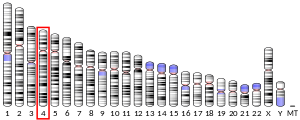Tachykinin receptor 3, also known as TACR3, is a protein which in humans is encoded by the TACR3 gene.[5][6]
Function
editThis gene belongs to a family of genes that function as receptors for tachykinins. Receptor affinities are specified by variations in the 5'-end of the sequence. The receptors belonging to this family are characterized by interactions with G proteins and 7 hydrophobic transmembrane regions. This gene encodes the receptor for the tachykinin neurokinin 3, also referred to as neurokinin B.[6]
Selective ligands
editA number of selective ligands are available for NK3. NK3 receptor antagonists are being investigated as treatments for various indications.[7]
Agonists
edit- Neurokinin B – endogenous peptide ligand, also interacts with other neurokinin receptors but has highest affinity for NK3
- Senktide – 7-amino acid polypeptide, NK3 selective, CAS# 106128-89-6
Antagonists
edit- Elinzanetant (BAY-3427080 GSK-1144814, NT-814)
- Fezolinetant (ESN-364)
- Osanetant (SR-142,801)
- Pavinetant (MLE-4901, AZD-4901, AZD-2624)
- Talnetant (SB-223,412)
- SB-222,200 – potent and selective antagonist, Ki = 4.4 nM, 3-Methyl-2-phenyl-N-[(1S)-1-phenylpropyl]-4-quinolinecarboxamide, CAS# 174635-69-9
- SB-218,795 – more selective than SB-222,200, Ki = 13 nM, (R)-[(2-Phenyl-4-quinolinylcarbonyl)amino]-methyl ester benzeneacetic acid, CAS# 174635-53-1
See also
editReferences
edit- ^ a b c GRCh38: Ensembl release 89: ENSG00000169836 – Ensembl, May 2017
- ^ a b c GRCm38: Ensembl release 89: ENSMUSG00000028172 – Ensembl, May 2017
- ^ "Human PubMed Reference:". National Center for Biotechnology Information, U.S. National Library of Medicine.
- ^ "Mouse PubMed Reference:". National Center for Biotechnology Information, U.S. National Library of Medicine.
- ^ Huang RR, Cheung AH, Mazina KE, Strader CD, Fong TM (Apr 1992). "cDNA sequence and heterologous expression of the human neurokinin-3 receptor". Biochemical and Biophysical Research Communications. 184 (2): 966–72. doi:10.1016/0006-291X(92)90685-E. PMID 1374246.
- ^ a b "Entrez Gene: TACR3 tachykinin receptor 3".
- ^ Quartara L, Altamura M (Aug 2006). "Tachykinin receptors antagonists: from research to clinic". Current Drug Targets. 7 (8): 975–92. doi:10.2174/138945006778019381. PMID 16918326.
Further reading
edit- Khawaja AM, Rogers DF (Jul 1996). "Tachykinins: receptor to effector". The International Journal of Biochemistry & Cell Biology. 28 (7): 721–38. doi:10.1016/1357-2725(96)00017-9. PMID 8925404.
- Advenier C, Lagente V, Boichot E (Aug 1997). "The role of tachykinin receptor antagonists in the prevention of bronchial hyperresponsiveness, airway inflammation and cough". The European Respiratory Journal. 10 (8): 1892–906. doi:10.1183/09031936.97.10081892. PMID 9272936.
- Buell G, Schulz MF, Arkinstall SJ, Maury K, Missotten M, Adami N, Talabot F, Kawashima E (Mar 1992). "Molecular characterisation, expression and localisation of human neurokinin-3 receptor". FEBS Letters. 299 (1): 90–5. doi:10.1016/0014-5793(92)80107-R. PMID 1312036. S2CID 29031625.
- Takahashi K, Tanaka A, Hara M, Nakanishi S (Mar 1992). "The primary structure and gene organization of human substance P and neuromedin K receptors". European Journal of Biochemistry. 204 (3): 1025–33. doi:10.1111/j.1432-1033.1992.tb16724.x. PMID 1312928.
- Xie GX, Miyajima A, Goldstein A (May 1992). "Expression cloning of cDNA encoding a seven-helix receptor from human placenta with affinity for opioid ligands". Proceedings of the National Academy of Sciences of the United States of America. 89 (9): 4124–8. Bibcode:1992PNAS...89.4124X. doi:10.1073/pnas.89.9.4124. PMC 525645. PMID 1315051.
- Huang RR, Cheung AH, Mazina KE, Strader CD, Fong TM (Apr 1992). "cDNA sequence and heterologous expression of the human neurokinin-3 receptor". Biochemical and Biophysical Research Communications. 184 (2): 966–72. doi:10.1016/0006-291X(92)90685-E. PMID 1374246.
- Dion S, Corcos J, Carmel M, Drapeau G, Regoli D (1988). "Substance P and neurokinins as stimulants of the human isolated urinary bladder". Neuropeptides. 11 (2): 83–7. doi:10.1016/0143-4179(88)90015-7. PMID 2452993. S2CID 13728584.
- Krause JE, Staveteig PT, Mentzer JN, Schmidt SK, Tucker JB, Brodbeck RM, Bu JY, Karpitskiy VV (Jan 1997). "Functional expression of a novel human neurokinin-3 receptor homolog that binds [3H]senktide and [125I-MePhe7]neurokinin B, and is responsive to tachykinin peptide agonists". Proceedings of the National Academy of Sciences of the United States of America. 94 (1): 310–5. Bibcode:1997PNAS...94..310K. doi:10.1073/pnas.94.1.310. PMC 19326. PMID 8990205.
- Brunelleschi S, Bordin G, Colangelo D, Viano I (Jun 1998). "Tachykinin receptors on human monocytes: their involvement in rheumatoid arthritis". Neuropeptides. 32 (3): 215–23. doi:10.1016/S0143-4179(98)90040-3. PMID 10189055. S2CID 40222022.
- Page NM, Woods RJ, Gardiner SM, Lomthaisong K, Gladwell RT, Butlin DJ, Manyonda IT, Lowry PJ (Jun 2000). "Excessive placental secretion of neurokinin B during the third trimester causes pre-eclampsia". Nature. 405 (6788): 797–800. Bibcode:2000Natur.405..797P. doi:10.1038/35015579. PMID 10866201. S2CID 4392048.
- Bellucci F, Carini F, Catalani C, Cucchi P, Lecci A, Meini S, Patacchini R, Quartara L, Ricci R, Tramontana M, Giuliani S, Maggi CA (Jan 2002). "Pharmacological profile of the novel mammalian tachykinin, hemokinin 1". British Journal of Pharmacology. 135 (1): 266–74. doi:10.1038/sj.bjp.0704443. PMC 1573107. PMID 11786503.
- Graham GJ, Stevens JM, Page NM, Grant AD, Brain SD, Lowry PJ, Gibbins JM (Aug 2004). "Tachykinins regulate the function of platelets". Blood. 104 (4): 1058–65. doi:10.1182/blood-2003-11-3979. PMID 15130944.
- Page NM, Dakour J, Morrish DW (Jul 2006). "Gene regulation of neurokinin B and its receptor NK3 in late pregnancy and pre-eclampsia". Molecular Human Reproduction. 12 (7): 427–33. doi:10.1093/molehr/gal025. PMID 16709596.
External links
edit- "Tachykinin Receptors: NK3". IUPHAR Database of Receptors and Ion Channels. International Union of Basic and Clinical Pharmacology. Archived from the original on 2012-05-31. Retrieved 2008-12-09.
This article incorporates text from the United States National Library of Medicine, which is in the public domain.




